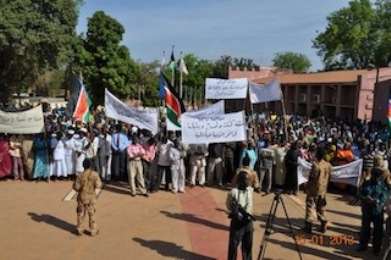South Sudan says not aware of Darfur rebels presence in Raja
May 26, 2017 (JUBA)- South Sudanese government under President Salva Kiir said Friday it is not aware of the presence of the Sudanese rebels from Darfur region in Raja, an administrative headquarters one of the newly created Lol state.

“As the government, we are committed to the terms and spirit of the cooperation agreement and the cordial relations and understanding of the two presidents, President Salva Kiir and his brother, President Omer El Bashir. With this spirit of cooperation, there is no any reason to not continue strengthening and enhancing areas of mutual benefits instead of continuing to rely on allegations and rumours which could be dispelled through dialogue and diplomatic engagements”, said Gatluak.
His comments echoed recent statements of the Information Minister Michael Makuei Lueth, who dismissed as baseless reports quoting Sudanese officials that Juba continues to provide supports and hosts different leaders of armed opposition factions with the objective to destabilise Sudan.
Sudanese officials recently claimed Juba and Cairo have backed attacks carried out stimulatingly by Sudan Liberation Movement -Minni Minnawi (SLM-MM) and SLM- Transitional Council (SLM-TC) on 19 May, 2017.
The first from Libya was led by SLM-Tc leader Nimer Abdel-Rahman and the second from South Sudan and led by Mohamed Abdel Salam (aka Tarada) SLM-TC. The later reportedly had been in prison in Juba before to be released in early May to lead the attack on East Darfur where he was killed.
Minister Lueth in a statement on Thursday denied the claim and instead accused Sudanese government of supporting South Sudanese rebels. The minister, who speaks as the government spokesman claimed they have “enough evidence that Sudanese government provides supports to the armed and non-armed opposition.”
“We have enough evidence that those people are in Khartoum and they are being accommodated in hotels, and military training camps are open to train them. So, the accusation that South Sudan is supporting Sudanese rebels is not true,” said Minister Lueth when asked on Thursday.
While the minister of information and presidential advisor on security affairs have denied the presence of the Sudanese rebels in the country, the deputy governor of Lol state, in his resignation letter of 19 may, 2017, accused Governor Rizik Zachariah Hassan of hosting Sudanese rebels in the area.
Lual Dau Marach said the presence of the Sudanese rebels in the state was a contradiction to the policy of the national government which advocates normalisation of relations with Sudan.
“Governor Rizik Zachariah is hosting Darfur rebels in our state to destabilise our relations with Sudan. You can see the contradiction. the national government is calling for normalisation of relations with Sudan and Governor Rizik is hosting Darfur rebels to destabilise Sudan,” wrote Marach.
The Sudanese army in the past used to bombard the alleged Darfur rebel camps in Raja of Western Bahr el-Ghazal region.
Observers in Juba say there are different positions in Juba towards the normalisation of relations with the Sudan. While some are favourable for the implementation of the security protocol included in the Cooperation Agreement of 27 September 2012, other like the former army chief general staff are hostile to the move for different reasons.
Paul Malong Awan was hostile to the implementation of the border demilitarised zone because it includes a part of Mile 14 area which is disputed between the Sudanese Rezeigat and the Malual Dinka, his ethnic group.
(ST)
